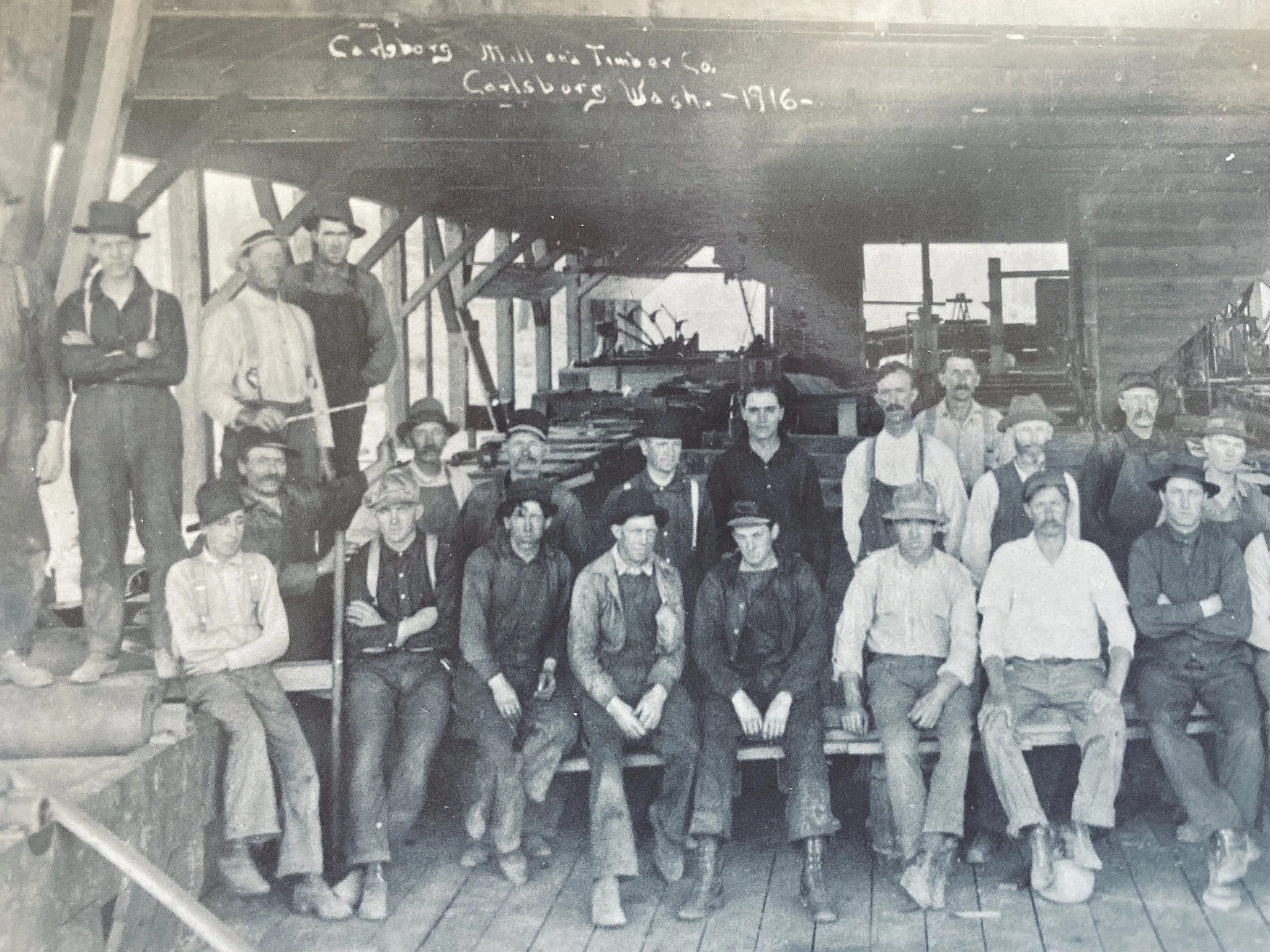The Coin of Carlsborg
Carlsborg Mill & Timber Company Store Script, circa 1925-1935.
During the latter part of the 19th century company towns were prominent across America. Industries such as coal mining, railroad manufacturing and lumber camps were the main occupations. Established in remote locations, jobs were often far away from neighboring towns. As a solution to housing and commerce, companies found it beneficial to own all the buildings and businesses for the developing community. Providing amenities such as schools, churches and libraries. This created a stronger community and would encourage a more productive workforce. Sometimes even leading to expansion that rivaled the larger neighboring cities.
But more often the reality of these monopoly towns was far from altruistic. These remote locations combined with lack of transportation prevented employees from shopping elsewhere or finding other jobs. Employees were often paid in company money (script) which was only redeemable in the company owned stores. Housing costs were deducted directly from their paychecks and exorbitant cost of living increases regularly led to debt. Forcing the employees to continue working until cleared.
As with Carlsborg, it was common for these small towns to remain unincorporated. The lack of elected officials and city government stifled people’s say in local affairs. Limiting infrastructure, ordinances and law enforcement. Further tightening the grip monopolies had on their employees. With the nature of extracting businesses, once the resources were depleted the companies moved on. Leaving a deserted and failing community in its wake.
Carlsborg Road Mill Houses
Carlsborg’s founder Charles Erickson began construction on the railway stretching from Port Angeles to Port Townsend in 1914. The first passenger train from Port Angeles to Sequim departed on July 21st, of that same year. In the summer of 1915, Erickson broke ground on the Carlsborg Mill and Timber Co. which he named in honor of his hometown in Sweden. Buildings and housing were quickly erected. Some were drug in on skids from the original local settlement of New Dungeness. Including the Carlsborg Store building we know today.
Clallam County infrastructure was growing rapidly and the Olympic Peninsula communities were becoming connected. The businesses that arose from the newly established Mill Town, such as the Carlsborg Store, Post Office, Movie Theater and Tavern were symbiotic yet privately owned. Old Town Carlsborg company mill houses still remain today along Carlsborg and Runnion roads. Mill workers and surrounding farmers were reliant on the goods and services provided in this little hamlet. Motorized vehicles were becoming more accessible and in 1920 the first paved route, known today as Old Olympic Hwy, was completed.
The trend of company money became a necessity for some operations during the Great Depression. When the stock market crashed in 1929, larger institutions used this alternative legal tender to keep production going while funds were scarce. But this could only last for so long. The much too common exploitation and abuse of workers led to the Wagner Act of 1935. Allowing private sector employees to organize into trade unions. As part of FDR’s New Deal, The Fair Labor Standards Act of 1938 established rules and regulations for federal minimum wage, overtime pay, and child labor. Also included was the ban on company money. Though difficult to enforce, this led to a steep decline in company towns and their substitute money. It wasn’t until 1967 when the coal unions and congress officially made company script illegal.
In 1930, the average hourly wage for a lumber mill employee, like the ones at Carlsborg Mill & Timber Co. was less than $0.36 an hour. Skilled labor, such as lead sawyer, making a little bit more and unskilled labor making significantly less, due to the unestablished minimum wage. The average work week consisted of six 10-hour days.
1925 ad from the 2nd edition of the Carlsborg Annual Review featuring $1 in trade company script
This $1 Carlsborg Store trade token that I often carry around in my pocket for show and tell opportunities would be worth almost $20 in today’s equivalent, though to me, the deeper significance is much more valuable.
“You load 16 tons, what do you get?
Another day older and deeper in debt
Saint Peter don’t you call me, ‘cause I can’t go,
I owe my soul to the company store.”
Carlsborg Mill & Timber Co. employees 1916
Carlsborg Store’s 1923 National Cash Register. Photo by Alyssa Teuton




